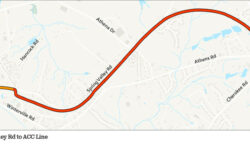An early version of a plan to guide growth in Athens for the next 20 years focuses on “nodes” around town that would slowly transition from car-centric to a more urban character.
The growth concept map, last updated more than 20 years ago, is meant to show how Athens-Clarke County will accommodate the estimated 30,000 people the county will add by 2050. Some specific areas that planners marked as “ripe for transformation” include Oak Grove off Jefferson Road, the area around Jefferson Road and the Loop, Alps/Beechwood, the General Time development on Newton Bridge Road, the “Space Kroger” on Highway 29, the Piggly Wiggly on North Avenue, the Nellie B/Triangle Plaza area in East Athens, the Firefly Trail, the Willowood shopping center on the Eastside and the Gaines School/Barnett Shoals/College Station intersection. Downtown and the Georgia Square Mall area would be designated for the densest development.
But incremental growth will happen in all neighborhoods, particularly those inside the Loop and those with sewer service. “They need to expect it. They need to accept that,” ACC planner Stephen Jacques said. “That’s how we’re going to grow without bankrupting the city.” The lower the density, the more expensive it is to provide city services.
Planners received more than 2,000 comments at public input meetings, walking and bus tours of neighborhoods, and tabling at community events. Some of the common themes planners heard were a desire for mixed-use, human-scale development; a variety of housing choices, including for seniors; housing affordability; structured parking rather than parking in front; filling vacant commercial space; support for restaurants and local businesses; safe walking and biking infrastructure, better transit and regional trains; more trees; protecting greenspace and rural areas; fishing and farming opportunities; and connections to parks.
Planning commissioners generally praised the map at their Dec. 16 meeting but did not vote on it. A vote is expected early next year to send it on to the mayor and commission for approval. Then planners will convert the growth concept map into a more detailed parcel-by-parcel version.
The planning commission also took its first look at proposed regulations on short-term rentals like those listed on Airbnb and VRBO. Many residents view them as a nuisance and believe putting those homes back on the market would lower housing costs.
Under the proposed law, homeowners in single-family zones could continue to rent them out to visitors for up to 30 days with a home business occupancy permit. “I’ve got to live there first. It’s got to be my primary residence,” ACC Planning Director Brad Griffin said. “But if I choose to rent it six weekends out of the year and get out of town on football weekends, I can enjoy that right.”
In other zones—multifamily, commercial and employment—short-term rentals would be treated as a commercial use like bed-and-breakfasts, subjecting them to stricter regulations. They would have to meet commercial building code safety standards and have a minimum amount of parking. The owner would have to give neighbors contact information in case there is a problem. But in those areas there would be no requirement to live onsite, so out-of-town investors could continue to buy and operate STRs.
Existing STRs would be grandfathered in because other communities have gone to court to force existing properties to comply with new laws and lost, Griffin said. “Georgia has very strong vested rights case law,” assistant county attorney John Hawkins said.
Griffin said the law would be enforced using data from a third-party vendor hired to track STRs. That vendor could also help ACC collect hotel-motel taxes from STRs.
Like what you just read? Support Flagpole by making a donation today. Every dollar you give helps fund our ongoing mission to provide Athens with quality, independent journalism.









